Is Xylitol Good For You?
Xylitol is a sweetener that seems to be winning the popularity contest amongst consumer’s desire for no calorie sweeteners. Claims support that it is “all natural”, safe for diabetic and the American Academy of Pediatric Dentistry supports the use of xylitol for oral health benefits (5).
But is xylitol good for you and should it be classified as a healthy sweetener? Depending on your health circumstances, you may want to avoid intake when possible or other otherwise limit your daily consumption.
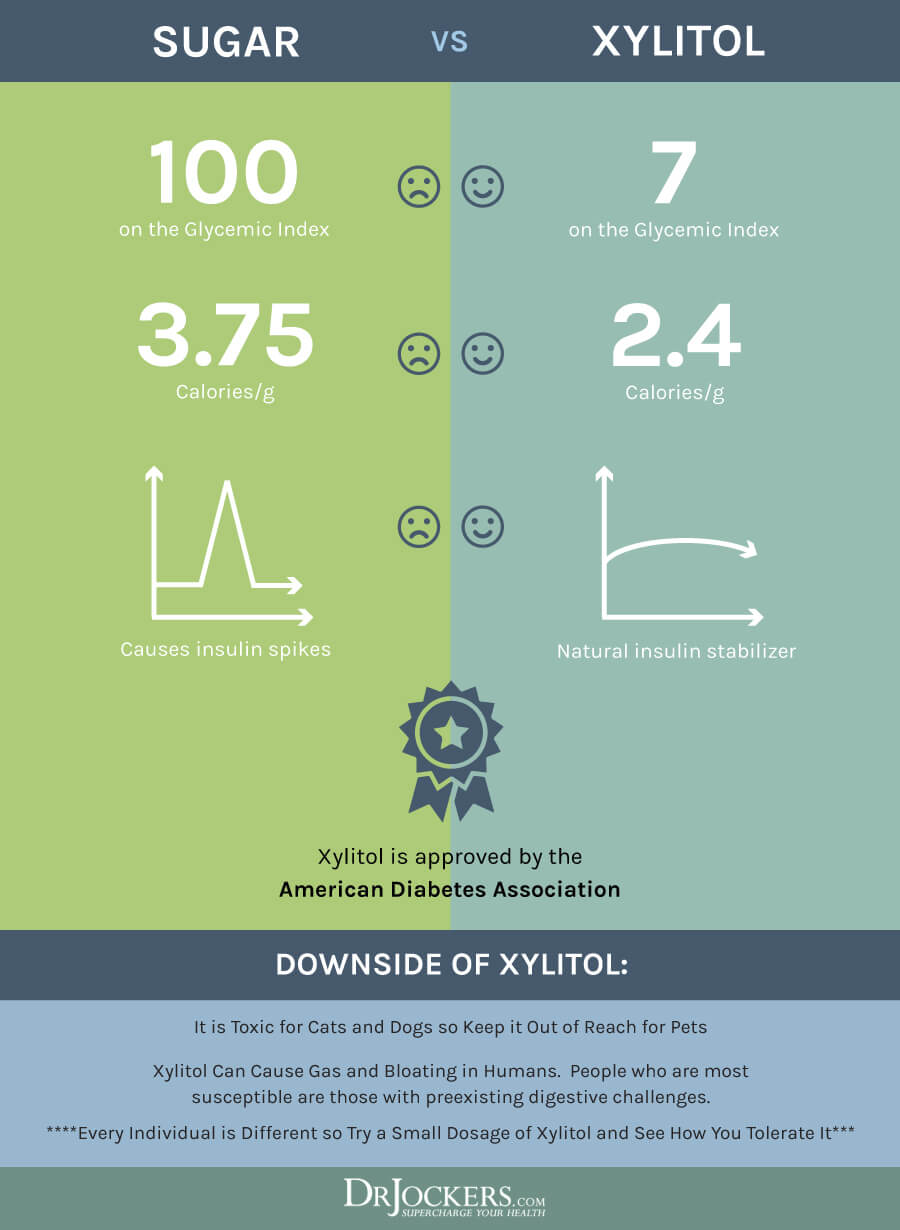
What is Xylitol?
Xylitol is a type of sugar alcohol known as a polyol and categorized along with other popular sweeteners you may have heard of including sorbitol, mannitol, lactiol and maltiol. Such sweeteners are created in a process known as “hydrogenation”- a process you have likely already heard of in many processed foods harmful to health. (1)
Although xylitol can be found naturally occurring in small concentrations of foods like berries, cauliflower and plums, it is typically prepared from its original form xylose (2). Compounds that make up xylose are chemically swapped for oxygen and hydrogen resulting in the low glycemic sweetener (1). This fact that xylitol is found in nature and is derived from a natural product allows government authorities to loosely regulate the labeling requirements of food manufacturers.
Numerous studies report that this sugar alcohol has no effect on blood glucose levels and in fact it is broken down in a process that does not rely on insulin secretion. Xylitol cannot be fully digested and absorbed within the human gastrointestinal tract and up to 20% of this compound is shown to be excreted in urine. In fact, only 50% of this sugar alcohol is understood to be absorbed by the small intestine begging the concern that this sweetener may have toxic effects from accumulating in the liver. (1)
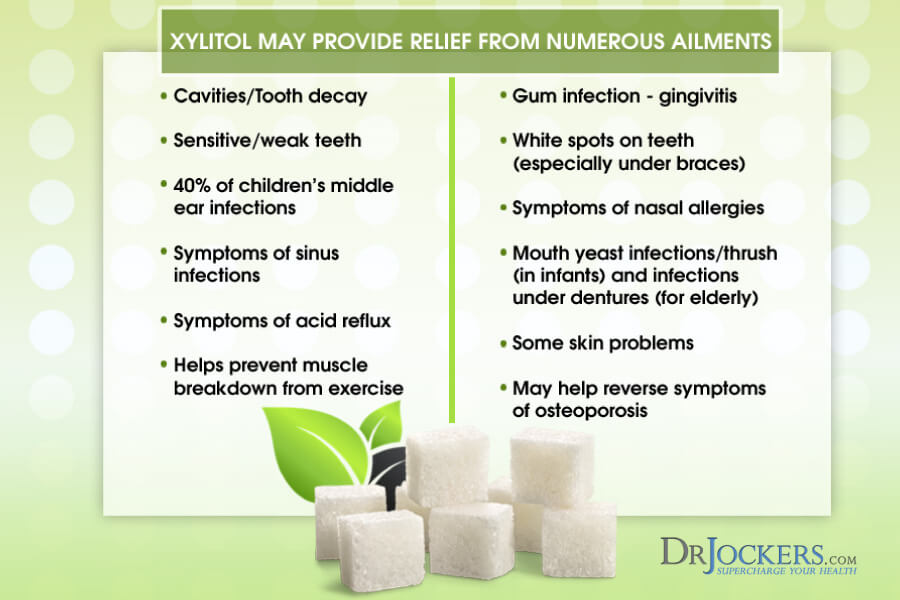
Oral Health Benefits
Xylitol is largely found in oral hygiene products including toothpastes, mouthwash, chewing gums, and mints and is intended to promote therapeutic benefits for oral health.
Antimicrobial:
If we do not yet fully understand where all components of this sugar alcohol are broken down and absorbed in the body, why has it gained popularity you should ask? It contains antimicrobial defenses against infectious bacteria such as pneumococcus known to cause pneumonia and meningitis. It also prevents the growth of harmful bacteria likely by causing a toxic effect within the encapsulated bacterium. (3)
In order to reap the antimicrobial benefits of sugar alcohol, it is recommended to consume products only containing pure xylitol without any other added sweeteners or in combination with foods containing sweetener. The presence of other sugars and sugar substitutes inhibits it’s ability to degrade and prevent bacteria growth (3).
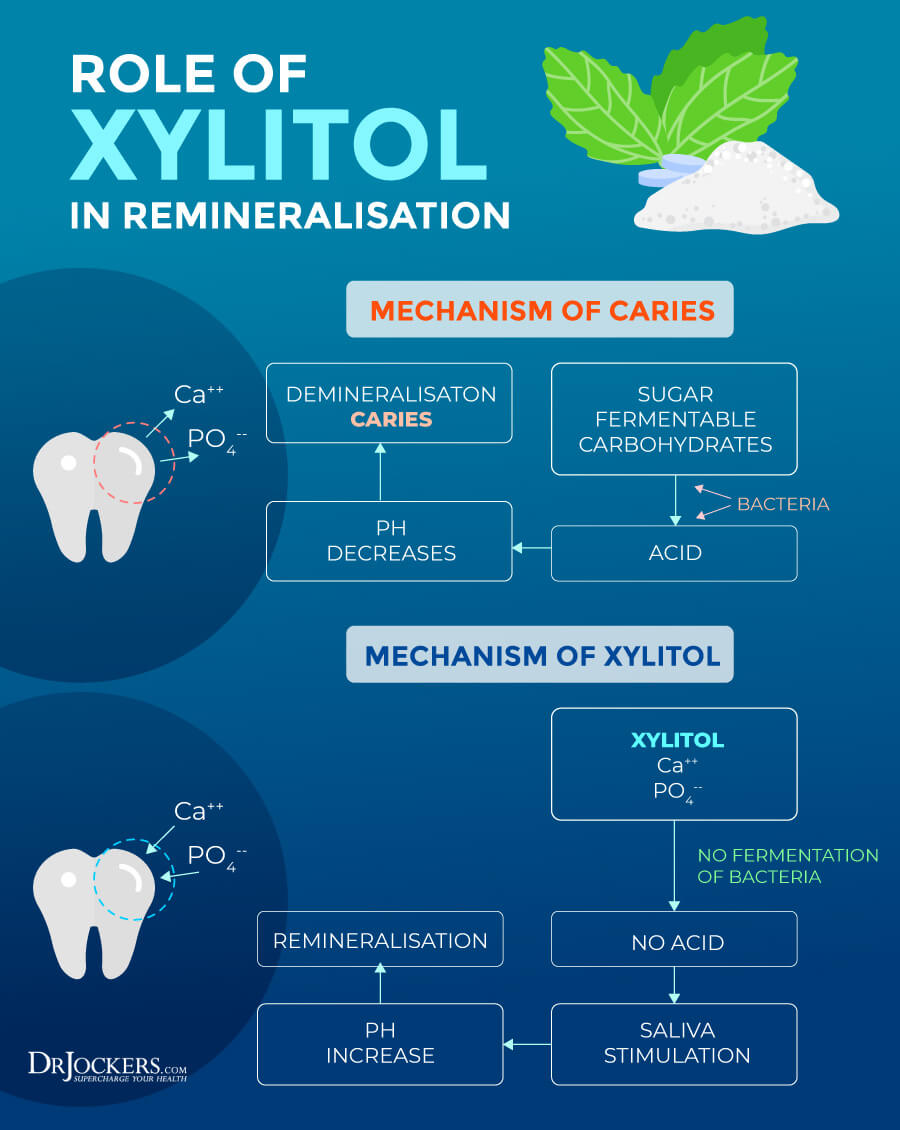
Anti-Carcinogenic:
The World Health Organization (WHO) classifies acetaldehyde as a highly toxic class 1 carcinogen. In other words, acetaldehyde is a compound sufficiently evidenced well enough to be labeled cancer causing in humans. This mutagenic product results from alcohol fermentation that harmful bacteria in the mouth can produce in large quantities. When ethanol found in alcohol is mixed with saliva, a reaction occurs to create acetaldehyde. (4)
Xylitol has been shown to inhibit microbes from producing acetaldehyde during the fermentation process. It can even completely eliminate this carcinogenic activity for some bacterial strains. The concentrations of this sugar alcohol used in such studies support that this anti-carcinogenic property can be obtained from chewing xylitol sweetened gum often throughout the course of a single day.
Lung Cancer Therapy:
A new study recently performed experimental treatment involving the effects of xylitol on cancer cells. What researchers found is that this sugar alcohol actually may have therapeutic benefits at treating lung cancer.
It was shown to inhibit cell proliferation of specific lung cancer cells and allow for natural cell destruction of cancer cells, a process known as autophagy. (6) Autophagy happens when your body recycles and gets rid of old or excess cells (such as cancer cells) that don’t serve a purpose or benefit your health.
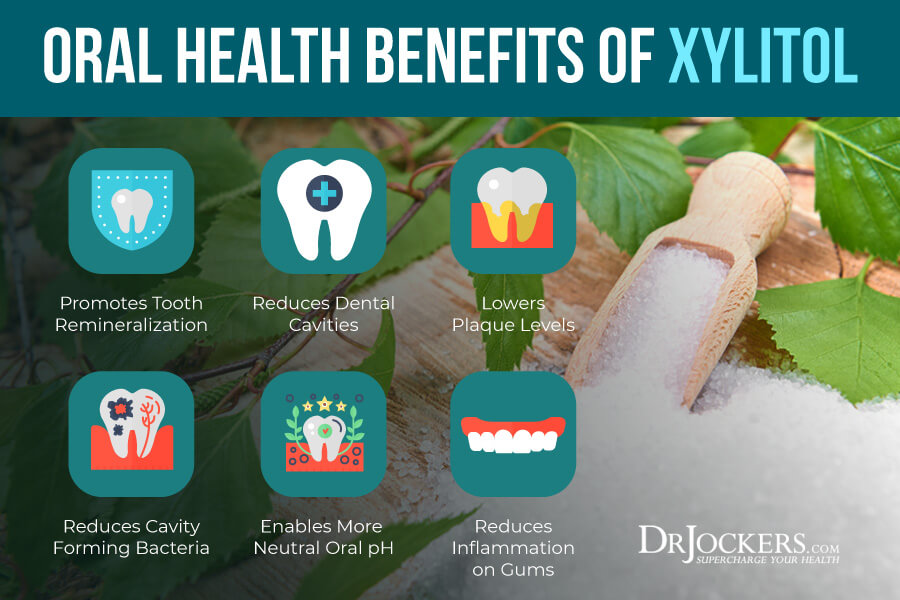
Warnings for Xylitol Consumption
Xylitol may sound like the perfect sweetener suitable for consumption by all individuals but it does not come without pitfalls. Unfortunately, conflicting evidence supports whether or not xylitol is a good sweetener because long term studies are limited in assessing its effects on health.
Potential for Metabolic Disturbance:
As previously mentioned, xylitol is not fully absorbed by the GI (gastrointestinal) tract. Therefore it may be likely that this sugar alcohol accumulates in the liver and may have toxic consequences when used in large quantities over extended periods and may lead to metabolic disturbances.
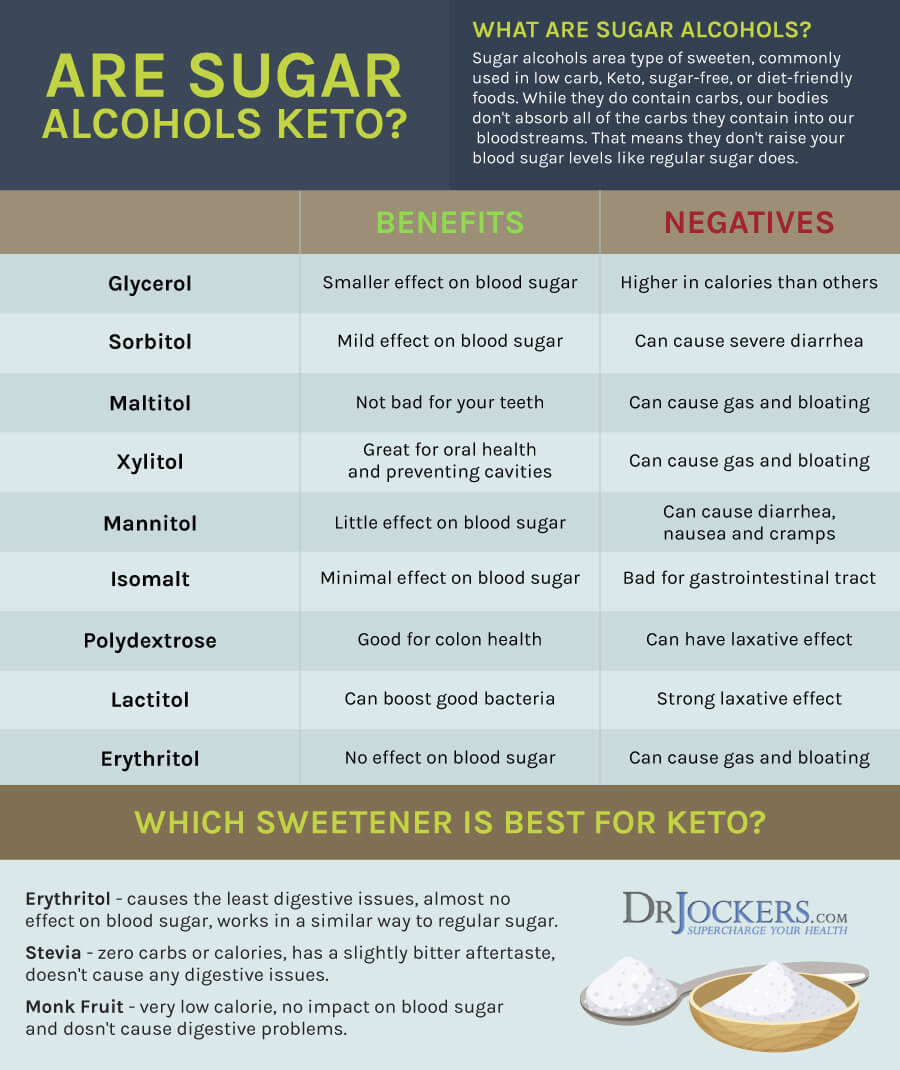
Gastrointestinal Upset:
Xylitol is in a class of fermentable carbohydrates called polyols. A large quantity of xylitol is passed to the colon and fermented by bacteria. The microflora here utilizes the sweetener to produce fatty acids as well as hydrogen and methane gas. As a result, these gases are associated with gas, abdominal cramping, bloating, constipation and diarrhea (5).
Evidence suggest that more than 10 grams of sugar alcohols daily can cause these GI symptoms which may be easily consumed unknowingly due to its increase in presence in products but not on labels. (1) As a result, individuals with gastrointestinal issues sensitive to fermentable sugars should avoid sugar alcohols all together.
People with gut complications such as irritable bowel syndrome, small intestinal bacterial overgrowth (SIBO) and Crohn’s disease may experience an increase of GI disturbances exacerbated by sugar alcohols.
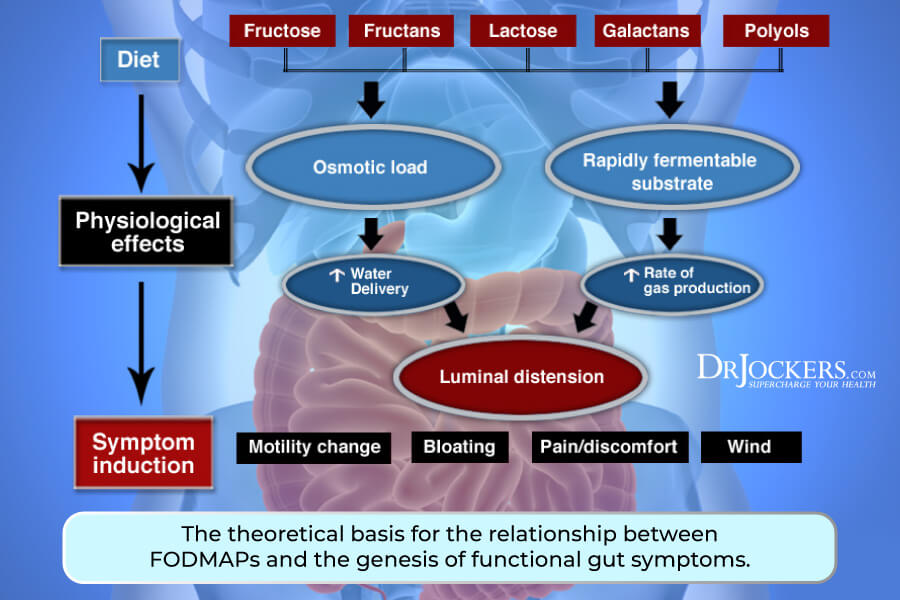
Malabsorption:
What foods you consume with xylitol and various nutritional components of foods containing this sugar alcohol may affect your ability to absorb each component. Ingesting sugar alcohols can limit the ability for other nutrients like fats and carbs to be properly metabolized.
Clinical trials have also shown that consumption of sugar alcohols can cause appetite dysregulation resulting in a lack of satiety and an overall increase in fat consumption. (1)
Drug Contraindications:
As a whole group, sugar alcohols can interact with drugs (1). Especially those drugs used by diabetics to manage weight should limit xylitol consumption.
Caution for Pet Owners:
Too many instances of dogs ingesting foods containing xylitol have left pet owners with tough lessons to be learned. The amount of this sugar alcohol found in a few cookies, a pack of gum and even English muffins is enough of the compound to cause severe hypoglycemia (low blood sugar) and life threatening liver failure in man’s best friend (7).
Summary
Although xylitol is a healthier alternative than sugar and high fructose products like agave, xylitol is best in small quantities even in the healthiest of people.
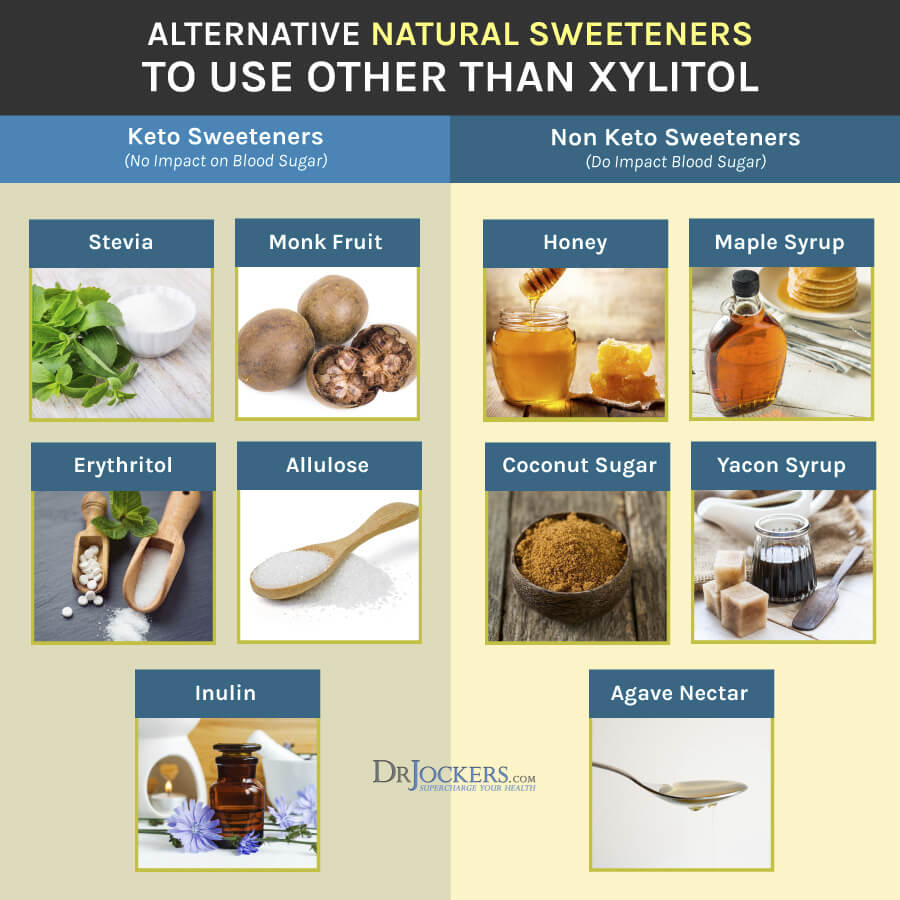
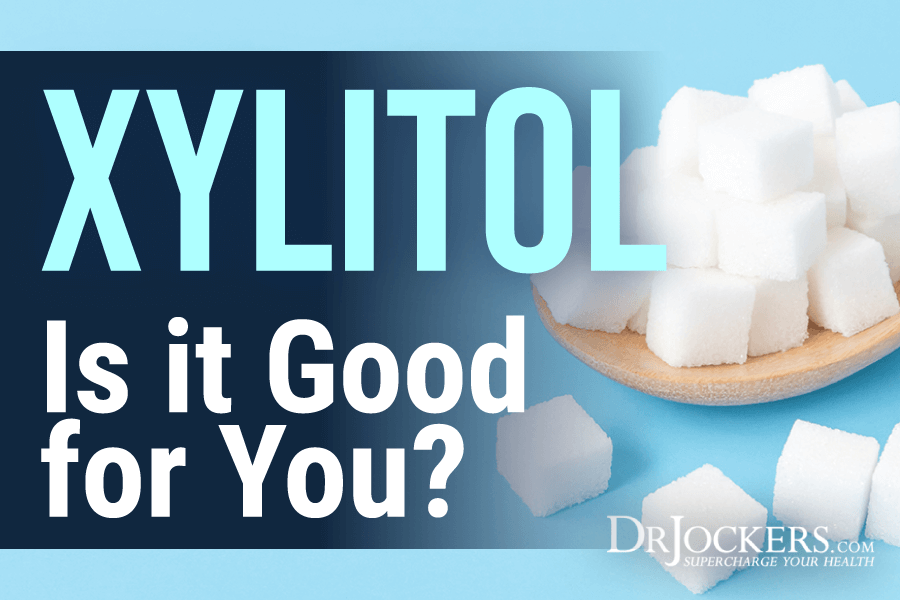
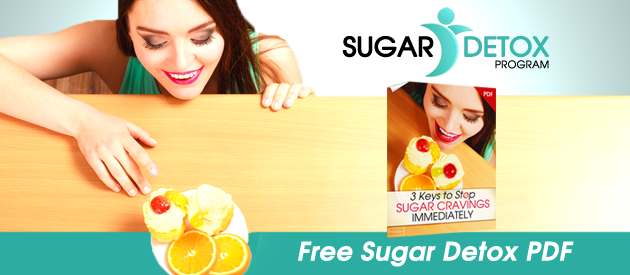
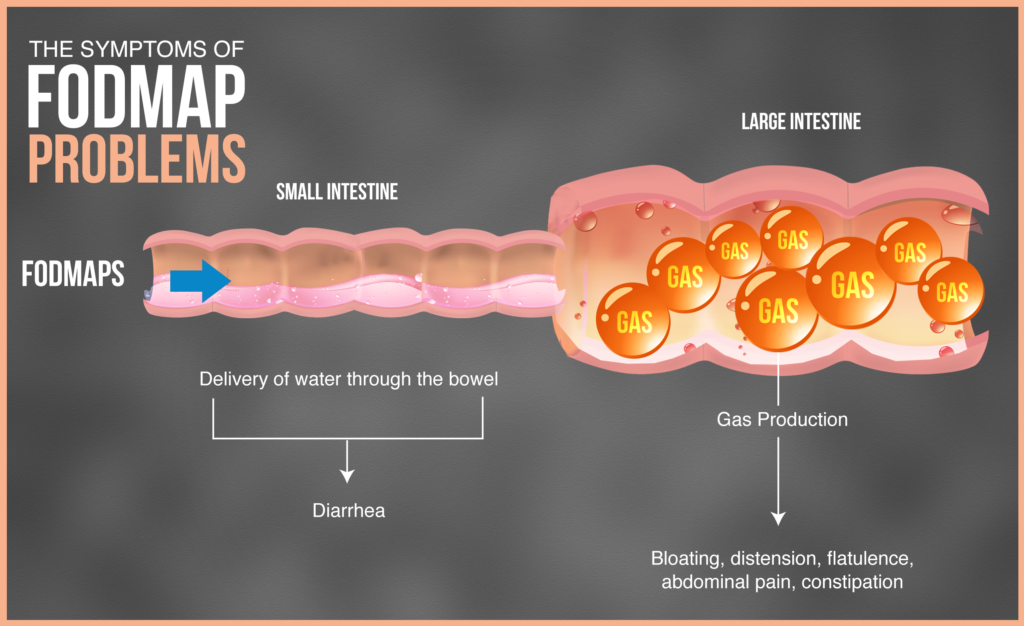



I find that xylitol leaves a burning sensation in my oral mucosa which progresses to an actual inflammation. Anyone that I mention this to has found this symptom to be unusual.
Yes that is an unusual experience Pat. Obviously, you are having some sort of an allergic reaction to it.
Thanks for your comment. I’m curious if anyone else has information about reactions to sugar alcohols.
xylitol is a deadly poison to dogs. I bought coconut swirls at the grocery chain, quite a few times, & was giving my large dog 2-3 + swirls out of each box, 5 or 6 boxes later he would run around in the back yard, fall on his side & have a seizure. This happened for about a month.Took him to vet. I had to carry him in because he could not navigate by himself. I had to put him to sleep (that hurt). Searching the web. I found confirmation of it’s being a deadly poison to dogs. This is a further distillation of corn syrup. On every item that uses xylitol, There is no warning of it being poison to dogs. Again FDA falls flat on their promise to investigate food sold to the consumer.
They even put xylitol into Flintstones vitamins for children.
The FDA is definitely not on the side of the consumer
Al, xylitol is poisonous to dogs, just as chocolate and onions are, but not to humans. However, for those with GI issues, in particular, Small intestinal bacterial overgrowth, it can cause gas and bloating.
Would it be good to melt the xylitol in water and use it as an oral rinse to get the anti-cavity benefits?
That is a great idea and there are toothpastes made with xylitol in them!
i’ve been using Xlear nose spray to control my chronic rhinitis daily . It contains xylitol.I also have IBS and multiple food sensitivities.What are your thoughts , should I stop using it?
It is probably just fine, but if you notice increased gas and bloating when using it, than it would be good to eliminate for a while and then add back to see if it is contributing.
Xylitol can be processed from trees like birch , but it can also be made with an industrial process that transforms a plant fiber called xylan into xylitol.
Thank you so much for the info Guadalupe!
https://www.ncbi.nlm.nih.gov/m/pubmed/14634832/
https://www.ncbi.nlm.nih.gov/m/pubmed/11727161/
https://www.ncbi.nlm.nih.gov/m/pubmed/11727161/
https://www.ncbi.nlm.nih.gov/m/pubmed/14634832/
These are pub med articles citing 2 instances where xylitol used in parenteral (post surgical) nutrition as a glucose substitute caused seizures and renal failure in humans. One, a 24 year old male died. In both instances, xylitol was the established cause. It’s not recommended for epileptics. Maybe it’s bioindividuality but how can a person know how they’ll respond? The two gentlemen cited in the pub med abstracts were not established epileptics. The FDA has recommended limited amounts for children. Our experience is that it does indeed induce seizures in those with a predisposition/history.
Thank you for the research Monica! I will advise against using this for individuals with seizure disorders.
I am a 52 year old, married, Caucasian female with two adult daughters and five grandchildren and my children and I all live in different states and although I am retired, my husband is not, so I take road trips without him up to a month at a time to visit family and friends. I am at the doctors anywhere from a couple of times a month to several times a week – depending on how I am functioning….
I am diabetic (25 years now), plus I am the proud owner of every single autoimmune disease that Rheumatology has to offer (approximately 30 diseases that impact my connective tissues) EXCEPT for RA (Rheumatoid Arthritis) plus I suffer from SEVERE gastro problems (Crohn’s Diseases, Colitis, Gastritis, Gastro-Paresis, continually narrowing esophagus, oral thrush and all of my mucus membranes are dehydrated which includes the inability to make my own saliva) plus I am allergic to most medications which makes me very challenging to treat from my many medical and holistic doctors!
I am the best guinea pig…. I have had to do elimination diets multiple times since I became sick with the autoimmune diseases in 2002 (age 36). I have been on some kind of diet aka eating regimen for most of my adult life. I have learned that I don’t do anything within “normal” guidelines by any means. Plus, the longer I have been sick, the more perceptive I have become to how I am feeling, overall, with the most simplistic changes in my diet and exercise regimens.
In the beginning of my non-diabetic related symptoms, it started with my not creating saliva (Sjogren’s Syndrome) which made swallowing my food very difficult. When I was working, I wasn’t allowed to drink any beverages unless it was my scheduled break times/lunch, so I chewed SUGAR FREE gum all day long, every single day, for several years before realizing how severe my dry mouth was! I was barely 30 years old when the saliva production was diminishing. By the time I was 36, my whole body was giving me grief and I didn’t know why nor understand what could possibly be ravaging my body and health so quickly! I worked in and around toxic chemicals for several years as a electrical maintenance technician in a semi-conductor manufacturing facility, in Silicon Valley, where the chemicals were located in the production and that area was my primary, daily, focus and the chemicals (sulfuric acid, phosphoric acid, boric acid, nickel chips, etc.) were heated to 200 degrees and rose into the surrounding areas so the fumes were toxic as well and I was elbow deep into them nearly all day, everyday for several years and the longer I worked there, the sicker I became (super-saturated sponge) – I was young and naïve as to the toxic effects this would have on me and only had safety glasses and gloves for protective equipment…. and since I ate an extremely healthy diet and exercised every single day I didn’t realize that I started to become ill with chronic symptoms at age 36!
The symptoms began with weight loss (3 to 5 pounds daily), a lump in my breast and every bone in my body was in excruciating pain to the point of not being able to get out of bed because it hurt so badly to stand up but it also hurt to lay down – no position gave me any relief. My dry mouth was now a desert plus my eyes were both having gritty/sand sensations in them and my perfect eye sight was beginning to be flawed by both near and far. I spent most of my time off at every specialist under the sun and nobody could figure out what was wrong with me. Many doctors and nurses would discuss my situation out of my sight and mostly I heard that I was crazy and it was all in my head so I needed a shrink; or I was so complicated they didn’t know where to begin for testing let alone treatment. I had been tested for Lupus almost every 6 months since becoming ill. I had to retire from my career that I adored (Electronic Engineering).
I retired, in 2003, at age 37! I didn’t get my first actual diagnosis until 2008 when I was diagnosed with Sjogren’s Syndrome (chronic dry mucus membranes in my whole body). I didn’t receive the other autoimmune diseases diagnosis until 2011 after, approximately, the 8th Rheumatologist – an old-school doctor who tested me for ALL of the different TYPES of Lupus – I have Lupus SLE. Meanwhile, I had to endure several surgeries – first the breast biopsy (benign thank goodness) plus 4 enlarged lymph nodes from the opposite arm pit at the same time! I was really sick! When I was healthy, I was 5′ 11″ and 155 pounds with 11% body fat. When my husband came home from his last tour in Iraq, he was taller than me (he is 5′ 9″) and that’s when we realized that I had shrunk 4 inches and I had lost 52 pounds (5′ 7″ and 103 pounds)! I have had to have my esophagus dilated a few times over the past 10 years or so; had a hiatal hernia repaired because 70% of my stomach was inside of my esophagus (first time it was dilated was during that surgery) in 2008; I lost all of my teeth due to chronic dry mouth but not due to the dental carries attributed to the lack of saliva (2010-2012). It ultimately caused my roots to decay and although I saw my dentist every 3 months plus brushed and flossed after every single time I ate (6-8 times daily due to diabetic dietary requirements – Reactive Hypoglycemia whereby my pancreas does not shut off and distributes insulin all of the time)….
I had to get prosthetic dentures (Dentures attached to titanium bars that are screwed, permanently in place, into 10 implants) so I could eat because I couldn’t have traditional dentures because you need to have adequate saliva in your mouth in order for them to remain in place in your mouth) and a feeding tube was not a viable option either because of my higher risk of infections forming….
So, in 2010 when I lost all of my lower teeth and got my first dentures, I had to stop chewing sugar free gum because it would stick too badly to the dentures. So, I started to use sugar free hard candies 24/7 and place them between my cheek and gum so I knew I wouldn’t choke on them when I went to sleep (cannot go without anything in my mouth for more than a couple of minutes or else my tongue will crack open and bleed from the severe dehydration)….
I also have gastro paresis (paralyzed stomach) which does not allow my stomach to empty its’ contents because the valve between my stomach and small intestine (duodenum) does not open very often to allow food to pass through my GI tract; then in 2015 I began to realize that I was having problems with regular diarrhea (I was only going to the bathroom approximately every 3 to 4 weeks so it took a little while to realize I was having a recurring problem) and my diet had not changed. I was using the same brand of sugar free candies for the past 5 years so I didn’t attribute my sugar substitute to the cause of my diarrhea….
I had to have both the upper GI series of tests as well as a colonoscopy (have had this a few times prior but early in my illness onset). During the necessary upper Endoscopy, the doctor dilated my duodenum as well as my esophagus again. During the prep to the colonoscopy, I realized I was allergic to the prep, 18 hours into the fasting/prep time. I was unable to reach the doctor at nearly midnight, so, I took some Benadryl and continued the rest of the prep. During the colonoscopy is when I was diagnosed with Colitis. After the test, my bowel and GI issues worsened immediately! Food would literally go through my body from the time I swallowed one bite until it was in the toilet, undigested, between 3 to 5 minutes! I went back to the doctor and he had diagnosed me with C-Diff and had me follow a strict protocol for that but I wasn’t able to tolerate the protocol either! Plus I was taking Viscous Lidocaine for the pain in my stomach caused by the dilation of the duodenum! The pain continued for a couple of months when my pharmacist wanted to know why I was refilling my prescription so often…. longer story, shorter, I got a second opinion!
When I went to the 2nd GI doctor (with current test results in hand), he told me that I did not have C-Diff, but, rather, I had Crohn’s Disease, Colitis and IBD (Irritable Bowel Disease) caused by Vasculitis which was being caused by my autoimmune diseases!!!
So, in a nut shell, my bowel was dying from lack of blood flow! After a year of trying and failing to be able to treat me with prescription medications (had allergic reactions to all of them!), he had to discontinue seeing me because he didn’t know what else to try! So, now we are at the beginning of 2017 and I found a Immunologist doctor to help me figure out why I am allergic to 30-40 medications! The pharmacist didn’t have time in his day to help me and I cannot call the pharmaceutical companies to get the information myself…..
So, the Immunologist started with more blood work and found that I didn’t have any antibodies in my body at all. Plus, he told me to take an antihistamine with the medications I am allergic to and that should be sufficient. It wasn’t!!!
I had a more severe reaction a week later and ended up in the ER. I was diagnosed with Costochondritis (inflammation of all of the cartilage in between my ribs from my collar bone down through my bottom ribs and it was so bad that it was pressing on all of my organs – short of breath (lungs); my heartbeat felt like a 3rd degree sunburn with every beat; my spleen hurt! Scary!!! I had a worse reaction the next month to include fiery hot hives with the costochondritis! Longer story short, I am allergic to the antihistamines!!!
So, I ended up having to redo all of my immunizations from when I was a child to present day (made me really sick) to see if I would manufacture my own antibodies, which, luckily, I did! Then as my immune system was being built up again, I had to do chemo to squash it back down so it wouldn’t attack my own body even more! I only made it through 18 weeks of the chemo (caused a recurring skin infection now) and it helped calm my gastro symptoms down for about a year. So, with all of this medical mess, I have learned a few things about supplementing whole foods (sugar) with something that is not a normal food…..
If you do not have a health concern such as high cholesterol or diabetes, then eat some fat and sugar and as long as you have a diet rich with the healthy foods (fiber) then your body will do fine with the “Real” food! Don’t eat fat free, sugar free or whatever and think it is calorie free because it isn’t. And, if you do need to supplement something, find what is compatible and “good enough” tasting to fill the need/craving and always EAT IN MODERATION! Too much of a good thing is not good for anyone. Too little of good, wholesome, foods are good for everyone! My husband was recently diagnosed with diabetes (2 months ago) and I have adjusted his diet to things he can be excited about and not feel deprived about the no sugar, low fat lifestyle. There are wonderful ways to get sweet, savory, or anything you desire with herbs and spices plus cooking methods and you won’t miss the fat, sugar, salt, etc. In the meantime, please eat in moderation and pay attention to how you feel afterwards for at least 2 days. If a food doesn’t agree with someone, it causes inflammation inside your body (bloating, etc.) but not everyone will notice the difference. So, the next morning after you have eaten something questionable, weigh yourself. If you gain 1/2 to 2 pounds literally overnight, something you ate yesterday did not agree with you! Remove those foods for a week or so (until you lose the 1/2 to 2 pounds you gained so you know the inflammation is resolved) and then try one food at a time, again, waiting several days in between introducing the next one, and you will figure out what you can and cannot/should not be eating.
Bon apetit! Thank you for your information about Xylitol and other alcohols, now I can advise my husband better. Thanks again and have a great day!
Hi Kelly, I am so sorry to hear about the health obstacles you have had to overcome. It sounds like you have become well educated and in tune with your body’s response to environmental influences including diet. Your husband has a great coach by his side to help educate him. We will pray for healing for you both. Blessings!
Hello,
I would like to know if xylitol is a high aldehyde food, since it is produced by fermentation.
I read that xylose is catalytically hydrogenated into xylitol and the conversion changes the sugar xylose, which is an aldehyde into the primary alcohol, xylitol.
Thank you for your time.